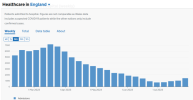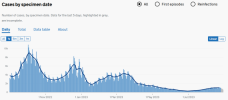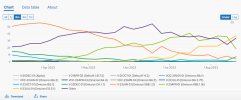Now a new study has found these cognitive problems could result from
blood clots triggered by infection, possibly through mechanisms like those that cause some types of dementia. These clots leave telltale protein signatures in blood, suggesting that testing for them could help predict, diagnose and possibly even treat long COVID.
The findings, published on Thursday in
Nature Medicine, suggest that existing blood tests for detecting these proteins could help physicians recognize long COVID (although some experts caution that long COVID’s symptoms and causes likely vary among individuals). Up to 15 percent of people who contract SARS-CoV-2, the virus that causes COVID, go on to
develop long COVID symptoms that can last for months or years. The condition has proved difficult to treat—or even diagnose—because of the mishmash of reported symptoms such as brain fog, fatigue, respiratory problems and numerous other effects. It’s still unclear whether the virus sticks around in the body or the initial infection triggers another reaction, such as an autoimmune response, that leads to the continuing symptoms.
To look into this question, lead study author and psychiatrist Maxime Taquet of the University of Oxford followed more than 1,800 people in the U.K. who were hospitalized for COVID between 2020 and 2021. Taquet and his colleagues checked in with the patients six and 12 months after their initial infection to monitor any prolonged symptoms and give them a cognitive test designed to diagnose disorders such as Alzheimer’s.
When the researchers examined blood tests taken while the patients were hospitalized,
they found that blood from people who still had brain fog six or 12 months after infection tended to have elevated levels of at least one of two proteins in their blood. The first protein, called D-dimer, is produced when blood clots break down in the body. Although patients with high levels of D-dimer reported memory problems, they did not score lower on cognitive tests. They were more likely to have shortness of breath and fatigue than other patients, however. Taquet suspects these effects could have been caused by blood clots in the lungs, which can also lead to low oxygen levels in the brain.
The second protein, fibrinogen, is produced in the liver and causes clotting to stop bleeding. Patients who had elevated fibrinogen levels during active COVID infection not only reported memory impairment but also scored poorly on the cognitive test. On average, people in this group scored under 86.7 percent six months after infection—a test result that could indicate dementia. Taquet says these findings suggest that either fibrinogen caused blood clots in the brain or that clots elsewhere in the body affected the brain, causing more severe cognitive symptoms.
Blood tests for both D-dimer and fibrinogen are already standard around the world, so researchers had plenty of available data to check whether the same phenomenon occurred in other groups of patients. In a separate analysis, the team examined health records from nearly 50,000 people in the U.S.—including some who had taken blood tests for fibrinogen or D-dimer before the pandemic started. Brain fog with elevated levels of D-dimer, they found, only occurred in people who had had COVID. But elevated fibrinogen seemed to correlate with brain fog whether or not a person previously had COVID, which indicated that cognitive problems caused by other conditions may also involve fibrinogen.





